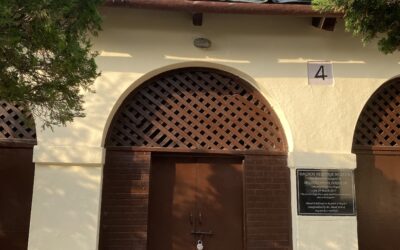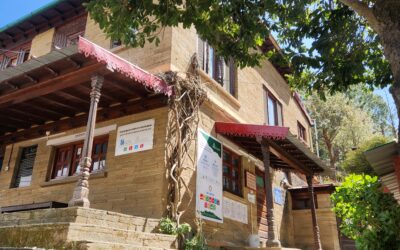Early in the morning, I left for field work, in Palghar, Maharashtra where I’m currently working with Under the Mango Tree (UTMT), a social enterprise. This was one of the designated tasks that demands to deal with orchard owners. I’m trying to find a relationship between Chikoo and bees. Yes, it may sound new and super interesting, but let me tell you the truth – it most definitely is!
I’m not a botanist but the information a layman can jot down and the knowledge one can gather from secondary research, is as much as could be done. We are further looking at assisting marginal farmers to rent their bee boxes to orchard owners for what’s technically termed as Pollination Service. It will be another livelihood opportunity for farmers, who are now Bee Keepers as well, trained by UTMT.
There already are multiple types of research cited on the topic from ecologically suitable areas for the growth of the fruit. But to begin with, the secondary research and views of Chikoo orchard owners in the area are not satisfying enough to know how and if Bees work on flowers of Chikoo tree. In this situation, holding an exclusive study for the first-hand experience and to verify another hypothesis makes more sense.
Leaving for field work is always refreshing. It makes the day lively. The journey is scenic through the villages, something I’m not used to, when living in the town. Passing by Vevji, one of the villages at the beginning of the range that ends to reach Boregaon, near Bordi, I recall the first time passing by the range, the ecstatic view throughout and an established smile on my face. How I wished it were the area I could pass by daily, just for the view and fresh air. Beginning with the field study and assessment of the area, I met beekeeping experts who helped me navigate through the research with their learning and network. I started my field research from a farm science center and got a few contacts for gathering more information. From every contact, I got a few more leads and the network built gradually.
The motive was to select Chikoo orchards without the presence of a bee box, although bees can travel from colonies around the area but are more likely to find food closer to their honeycomb. A crop or a crop fruit can either be a nectar or a pollen source or none of them as food for bees. This is another detail we wanted to have, for personal learning.
Coming back to the morning that I left early for the field, I found a few leads in Boregaon, eager as ever to pass by the range with a hope to have a good shot at the meeting. HN kaka, a beekeeper by hobby since more than 20 years, is whom I called first but the phone disconnected and went unreachable. I try a few other numbers and decide to head to the area. This time, I’m on a bike, pillion riding with a stranger who is going the same way, stopping by a community center to meet an orchard owner who’s also the village agriculture community member. Sitting with the members, sharing their work stories and listening to their viewpoints was necessary to have them become a part of the study.
The responses were encouraging. They all wanted me to meet HN kaka. I had heard about him from a couple of groups now. As we continued the discussion, I hear someone yell out “Kaka“ and I look towards the entrance leading to the road. This man gets off his cycle, with gumboots on, and starts walking towards the room. We get introduced and he’s interested to share his knowledge and show me the area.
The same week I visit his farm where we spoke about his beekeeping experience. It was really impressive to see his in-depth knowledge on the theme. We visited the orchards around and met their owners to explain them my work. He knew everyone personally, since he had been there for a long time now. This man was working with me to build a team and from where I saw, there was nothing in it for him. It’s rare to experience such humility and he was not the only such person I’ve met during the fellowship.
Not just once but a lot of times, he walked with me in the area covering more than 3 km on foot, having pain in his knees. “You do what you have to do”, he says, when I thank him for the inimitable help. He wished for sustainable progress for the society as well as the ecosystem for holistic development, presenting a positive attitude. All the efforts put in, paid off in meeting the people he had picked as per the project. I found the aptest location and people to work with, for pollination study.
When one works with people having the aura as his, then it inevitably gives more meaning to your work and goes beyond just completing a task. It is more fascinating as an occupation and not just a day job.
Looking back, I wanted to work in this location if only to pass by the ranges, and everything had just connected to make that possible. It’s a common realization of events in hindsight when you join the dots and it all makes sense, regardless of what the dots were.




This was a good read Karan. I could form an image of HN kaka, his farm, bees and you. Totally enjoyed the field story 🙂
I’m glad Swati, thanks. 🙂